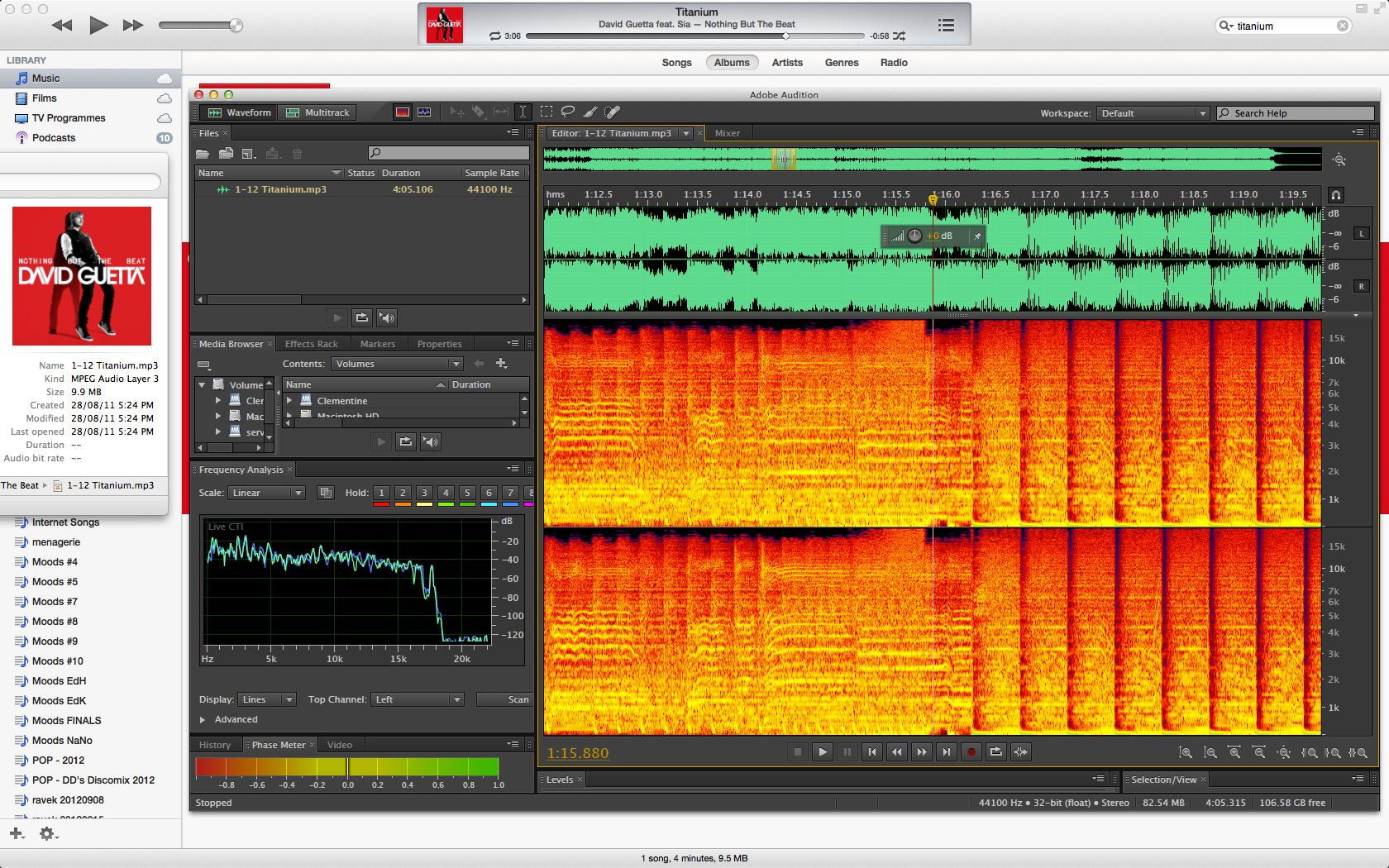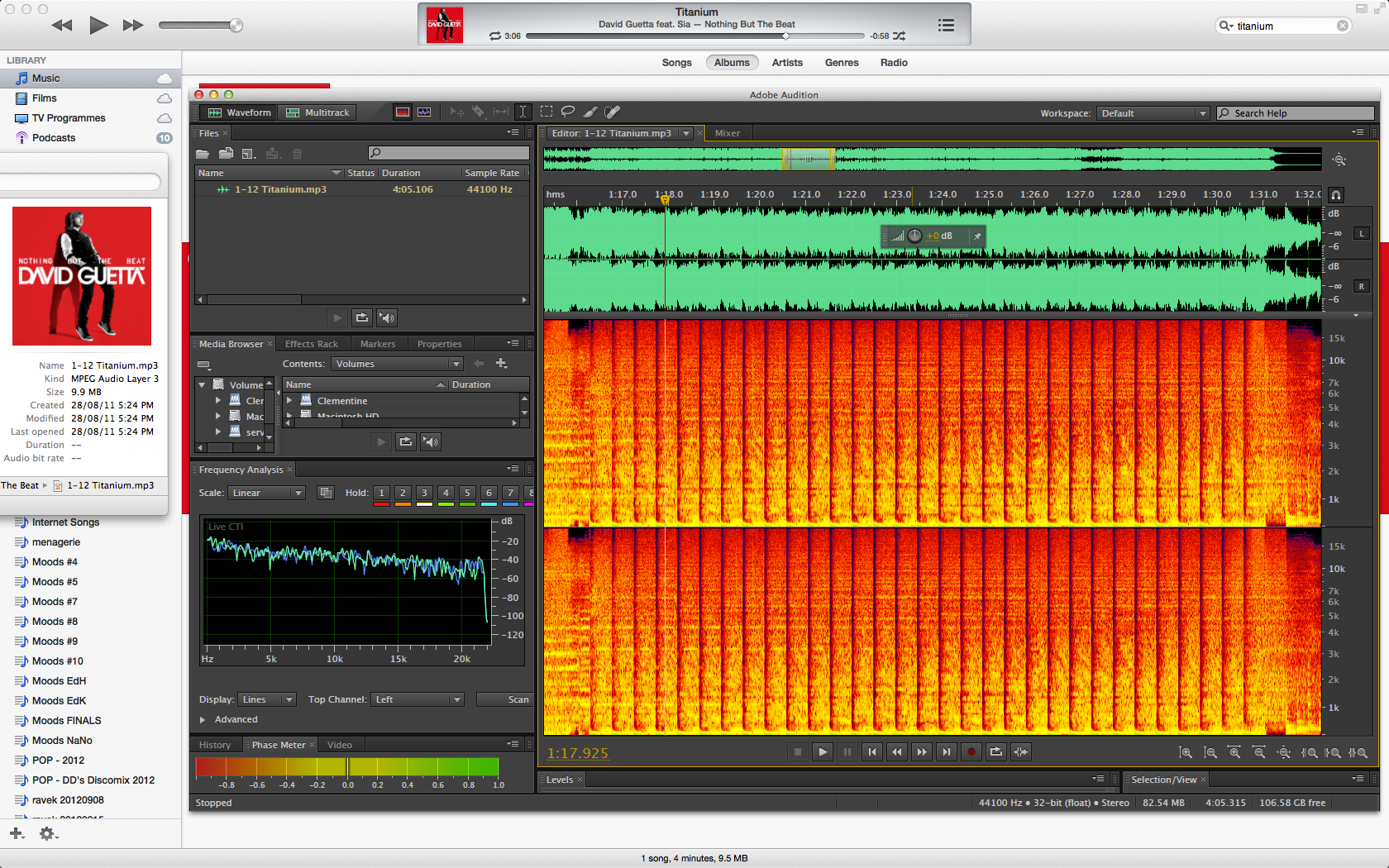The Beauty of Music
Sunday, 2 December 2012; 3 pm
One of the things I truly love about music in general is the beauty inherent in it. This statement is so strongly countered by the modern trash that graces our radios and music players; pop music, especially pop-electronic, and I’m lumping dubstep, brostep, jungle and hardstyle all into that histogram bin, has lost it’s touch with the true magic of music, preferring instead to turn out the same rubbish over and over again.
Everything That’s Wrong With Pop Music
Let me provide an informative example: Titanium, by David Guetta ft. Sia, embodies everything I believe is wrong with music at the moment. It uses exactly the same sound that every other popular song at the moment uses: a breathy female vocalist behind a punchy synthesized or filtered instrument; in this case, Sia, behind what apparently sounds like a guitar, but it becomes obvious it’s a synthesizer.
Of course, the other thing is a non-organic, very machine-driven rhythm. So much for a metronome which slowly winds down over time; the drum line is much too heavy and dominant, and half of it isn’t even drums – it’s clearly a loop of what J. Random Muzo thinks a drum should sound like, which sounds nothing like a real drum. Of course.
Like all popular music, it drops. I even think that, to make it onto a popular album these days, you need to drop everything. If you’re not familiar with the idea of a ‘drop’, it’s the point immediately after a ‘build-up’ typically where the rhythm track hiccups, the instruments fall away (unfortunately, not literally) for a beat, then return, typically in a much harsher, “chorus” configuration. Yeah, it’s what happened to the switch from a verse to a chorus. It’s all dramatic. And stuff. This is what a drop looks like:
If, at this point, you choose to tune me out because I’m clearly a snob when it comes to music, you’ve got the right idea. I am a snob when it comes to music. But let me finish my dismemberment.
At least this song doesn’t feature an autotuner or vocoder, otherwise this soap-boxing would never end. But there are filters on the vocalist, to make her sound “better”. Well, of course not. How about these vocalists learn to sing properly? That certainly would make them sound better.
Let me end this section of the rant by saying: compression is the worst thing to happen to music – and Titanium shows fantastically why bass compression is terrible. In decent speakers (even my aged Monster PersonOne speakers classify as “decent”, and that’s saying something), when you feed a bass note in, it produces a base sound, and you may safely interpolate a higher frequency in and it’s reproduced nicely. Right.
Well, no. If you, for instance, are listening through almost everyone’s excuse for cheap headphone speakers (with the possible exception of the ~~Cybus~~Apple EarPod), there’s next to no bass response, because the speakers are simply too small to reproduce it. So, instead, to “boost” the bass sound, why don’t we filter out everything except the bass frequencies at high-bass points? Sounds like a fantastic idea, except it only really works effectively for in-ear headphones. If you have an 800 W active speaker stack, it just sounds silly, and takes your amps for a jolly good workout, hopefully not blowing up the subs in the process.
You can clearly see the “benefits” of bass compression in the previous screenshot. Here’s another one, showing very, very clearly the drop-away in signal on each beat.
Improving Popular Music
There exists a set of music M which contains the set of all good songs.
Wait, hang on. Music sets, not mathematical sets.
There are examples of good music around. I reguarly raise a number of artists, including Jean-Michel Jarre, Professor Kliq, Röyksopp (although some of their more modern material, such as the two albums The Understanding and Junior were dominated by a pop sound), Bonobo, Caravan Palace (who have an interesting take on jazz and swing that leans more towards a pop sound), Flying Lotus, Taragana Pyjarama, Corelia, Tomita, Vangelis…
I could go on.
But I won’t. Y’know why?
Because there is such a huge set of music out there that doesn’t conform with the pop idea. It doesn’t exist to make music publishers happy with the size of their cut. It exists because someone turned out a sound that was unique and different, and people found it listenable and enjoyable.
I look for five things in a song:
-
fun: it needs to be appealing and vibrant. Even shoegaze and trance is fun, in a different way. Most pop music has surpassed fun, and becomes a chore to listen to. It’s easy to find fun music in festivals and music shows – an excellent place to find fun, obscure music, especialy unexpectedly fun pop music, is Eurovision. And here’s an excellent example: Party for Everybody, by Buranovskiye Babushki, the Russian entry in Eurovision 2012.
-
technique: most artists with good music have a good musical technique. That’s why old pop, like ABBA, still beats modern pop, hands down. Technically skilled artists will wind up with time to explore the aesthetics of their music; such an artist is Professor Kliq, who has released a range of albums, all under Creative Commons licenses. Plastic and Flashing Lights is an example from an album professing to be an experimentation in sound and perspective, and while it immediately appears to have a pop-like sound, akin to, say, Titanium, the difference is that this song doesn’t appear to be setting out to be pop music.
-
aesthetic: some good artists have an excellent understanding of the aesthetic of the music they’re trying to create, and when they’re clearly setting out to explore that aesthetic, when they have a clear stylistic fingerprint built on how their sound is built, then they have the ability to produce masterworks. Trip-hop is one of my favourite electronic subgenres, and Emancipator is one of my favourite artists; the exploration of the aesthetic in, say, Nevergreen, really embodies what I want to hear in music.
-
uniqueness: when an artist is banging out the same general tune with every song they release, producing exactly the same sound with every new release, they’ve failed as an artist who tries to evolve their music, their sound. This is one area where I find remixes incredibly powerful – they exist because someone finds that they can improve on the idea of a song, and just browsing around SoundCloud will find you many hundreds of remixes of modern songs. Röyksopp explores the varieties of music they produce, and while I don’t necessarily agree with the direction some of their songs head in, they way they are executed is musically excellent. By far and away, Eple embodies the idea of exploring a unique sound through an incredibly powerful remix of Bob James’ cover of You’re As Right as Rain, which I love too.
-
narrative: which isn’t really a word many people associate with music, but I love music that tells a story about a time, or a place, or an idea, and it does so simply through the sound it produces. Jean-Michel Jarre’s Second Rendez-Vous exemplifies this beautifully, as do many other works by Jarre.
If I find a song with most, if not all, of these things, I’m onto a winner.
Related Posts
- The Art of Science Fiction 08 Oct 2013
- Review: The Inevitable End 05 Nov 2014
- The curious incident of elspeth in the mid-afternoon 08 Jun 2014
- Host Naming 09 Apr 2014
- Mobile Phones: Assorted Thoughts 31 Jul 2013
About this post
- Date & Time
- 2 December 2012, 15:10:03
- Words
- 1301
- Tags
- music and opinion
![[Photo by Michelle Dwight.]](/~jashank/assets/images/profile/9/profile-9-sq.png) Jashank Jeremy
Jashank Jeremy

